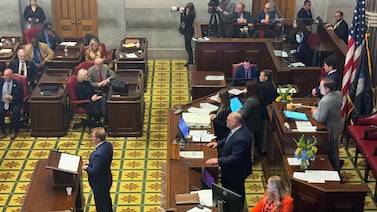Sign up for Chalkbeat Colorado’s free daily newsletter to get the latest reporting from us, plus curated news from other Colorado outlets, delivered to your inbox.
The Denver teachers union says its contract with Denver Public Schools should mean bigger pay raises next school year. But DPS says it doesn’t have the money.
At issue is a provision in the contract between DPS and the Denver Classroom Teachers Association. The provision says that if Colorado lawmakers boost funding to DPS by reducing the so-called budget stabilization factor, a mechanism that withholds state funding from K-12 schools to pay for other priorities, Denver teachers could get bigger cost-of-living raises.
After years of advocacy from both DPS and the teachers union, Colorado lawmakers did indeed vote this year to “fully fund” K-12 schools going forward. But DPS and DCTA disagree about whether the Denver district will have enough money to pay teachers those bigger raises.
“We did our part,” said Rob Gould, president of the DCTA. “We advocated.”
DPS should raise its teacher salaries to stay competitive with surrounding districts, Gould said, many of which are set to pay starting teachers more than Denver does.
“Just like everybody, we’re trying to put gas in our car to go to work, we’re trying to keep up with costs at the grocery store, we’re trying to keep up with rent,” Gould said of Denver teachers.
But DPS officials said the expected increase in state funding is not enough to trigger the provision about cost-of-living raises in the contract, which they said has been favorable to teachers overall. The average salary for Denver teachers has increased 47% since 2018, a year before the union went on strike for higher pay, according to a district presentation.
“We love teachers,” said district spokesperson Bill Good. “We value our teachers. This is a contract dispute, for lack of a better term, and has no bearing on how much we value our teachers and appreciate our teachers.”
The contract between DPS and DCTA dictates how much teachers are paid. Signed in 2022, it promised that if state lawmakers boosted DPS’ funding by enough money to cover the cost of teachers’ guaranteed step-and-lane raises, teachers could also get “full” — meaning more generous — cost-of-living raises in the 2023-24 and 2024-25 school years.
That happened for the 2023-24 school year. Teachers and other union members got an 8% cost-of-living raise on top of raises for years of experience (steps) and education (lanes). In total, union educators got an average 11.5% raise this year, according to the district.
But DPS officials said the district doesn’t have enough money to do the same in 2024-25.
Next school year, officials argue that the expected increase in state funding to DPS won’t cover the cost of teachers’ guaranteed step-and-lane raises. DPS will be about $3 million short, said Chuck Carpenter, the district’s chief financial officer. As such, the provision in the contract granting teachers’ full cost-of-living raises won’t be triggered, district officials said.
Instead, DPS is proposing to give educators a 5.2% raise plus a $1,000 stipend next year. DCTA is asking for raises that would total an average of 8.3%.
To raise awareness of what the union characterized as DPS “backtracking” on its agreement, educators staged “walk-ins” at schools across the city last week and were set to hold a rally outside a Denver school board meeting Monday afternoon.
In an email from Denver Superintendent Alex Marrero to Gould, Marrero wrote that DCTA “knew, or should have known, that it was unlikely, if not impossible” for the district’s budget to increase enough for the contract provision to be triggered two years in a row.
Gould disagreed that the union knew its members wouldn’t get more generous raises. And he questioned the district’s integrity in making the contract deal.
“Why on earth would you make a deal if you had already known you couldn’t pay it?” Gould said. “To me, that’s bad faith bargaining.”
The teachers union disputes that DPS is $3 million short and has filed a grievance with the district. Union leaders said the district should take into account the annual “turnover savings” that result when veteran teachers at the top of the pay scale retire and are replaced by early-career educators who make less money. Over the past two school years, that savings has been about $10 million a year, according to district documents cited by the union.
But DPS said the turnover savings are not part of the calculus in the most recent contract.
“There is nothing in the contract that says if the money isn’t there on the [budget stabilization] factor buy down, we can go to these other sources to get that money,” Good said. “Our position is because the trigger wasn’t met, we are holding to the contract, which is 5.2% and $1,000.”
If the trigger was met and DPS had to pay the approximately 5,700 educators covered by the union contract a full cost-of-living raise, Carpenter said it would cost DPS another $16.9 million.
“That is a lot more than what we’ve got,” he said.
Gould, on the other hand, said the turnover savings are referenced in the contract. The provision in question mentions that costs to the district should be calculated “on actual expense,” which Gould said is shorthand for the cost of step-and-lane raises minus the turnover savings.
A hearing on DCTA’s grievance is scheduled for Tuesday, Gould said. If the district hearing officer sides with DPS, Gould said the union is prepared to request arbitration or eventually file a lawsuit.
Melanie Asmar is the bureau chief for Chalkbeat Colorado. Contact Melanie at masmar@chalkbeat.org.







